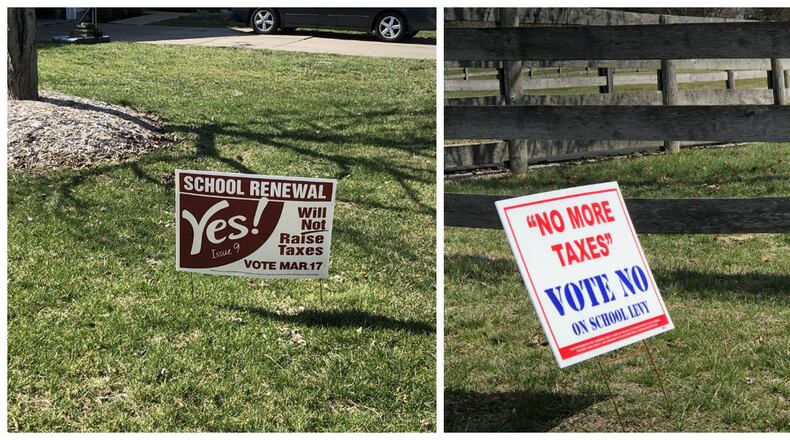In Lebanon, voters are deciding whether to renew an existing 4.1 mill levy that will generate $4.2 million a year for operating expenses. No increase would show up on property tax bills, including the levy. It would still cost homeowners about $143.50 per $100,000 in property value, according to Warren County Auditor’s Office projections.
“This certainly contributes to what I would call levy fatigue,” Superintendent Todd Yohey said as the board went back to voters who in the November 2019 election approved an additional 4.99-mill levy for four years, rejected in May 2019.
School officials went on the local TV station to answer levy questions. Opponents posted signs, some mirroring those put up by those in support of the Lebanon renewal.
RELATED: Lebanon school district see another levy on March ballots
Opposition has also been raised to a 4.7-mill bond issue on ballots for the second time in the Kings Local Schools and estimated to raise just shy of $90 million over 37 years.
The revenue is to finance new construction and renovations of Kings High School, Kings Junior High School, Columbia Intermediate School and J.F. Burns Elementary School. Advocates campaigned for passage.
Anti-tax advocates, through a group called Citizens for a Better Warren County, prompted state reviews of the campaign collections.
The Coalition Opposed to Additional Spending and Taxes (COAST) called for the Kings school board to investigate “apparent use of public-school resources in support of advancing their forthcoming levy.”
Ohio Auditor Keith Faber issued a statement about this issue.
“You cannot campaign or influence the outcome of a levy or bond issue using tax dollars,” Faber said. “This time of year, my office receives lots of questions regarding the use of tax dollars and resources on these issues.”
If the levy passes, homeowners in the Kings district would see their tax bill go up $164.50 for every $100,000 property value, beginning in the 2020 tax year, according to a chart of the levies prepared by the Warren County Auditor's Office.
RELATED: State reviewing complaints about Kings levy
In Mason, voters will be asked to vote on a new kind of tax issue.
The proposed continuing aggregate levy would increase from 4.71 mills in the 2021 tax year to to 9.96 mills for each dollar of property valuation in succeeding tax years.
Starting in 2022, Mason district property owners would pay $349.6o for every $100,000 of value.
This levy is projected to raise more than $20 million a year for the district.
The good news for these taxpayers is that millage financing an existing bond issue on Mason High School is to be removed from tax bills in 2022.
“Mason City Schools currently collects 7.9 mills as voted on by the people of Mason to pay for the construction of buildings. As the loans on some of those buildings are paid off and/or paid down, the amount of mills required and collected is anticipated to decrease by a net of 5.25 mills. The bond roll back will happen regardless of this levy,” according to a note on the auditor’s chart.
Auditor Matt Nolan added, “Effectively voters would feel the 4.71 increase in 2021, but not feel any increase after that. Obviously if they voted no, they would see a decrease in millage come 2022.”
Mason levy supporters, including school officials, are campaigning hard for this levy.
“Mason has not received new operating levy funds in 15 years. The revenue we are asking voters for is needed to maintain the Mason Quality that exists today. If we fail, this will be the second consecutive levy failure in a decade and our quality and reputation will change,” according to a recent press release urging voters to watch a video on the district web site.
“Let me be clear, there are no easy options. These cost structure changes and program reductions will change Mason. Every decision will make an impact that changes who we are as a district and what we can do for kids and their families,” Superintendent Jonathan Cooper added.
RELATED: Mason schools cite $6M deficit in seeking tax hike in March
In the Little Miami District, voters are seeing a proposed 9.92 mill substitute levy expected to continue costing homeowners $303.80 for every $100,000 of property value. This continuing levy is projected to raise more than $10.6 million, while enabling the district to benefit from new homes and other properties developed in coming years. If property values plummet, collections on this and other substitute levies would also take a dive.
Early voting is available through Monday, March 16.
Staff writer Michael D. Clark contributed to this report.
EARLY VOTING
Voters who want to get their ballots in before primary Election Day on March 17 can vote absentee by mail or in person at their county board of elections offices.
The deadline to request absentee mail ballots is three days before the election, or March 14. Absentee ballots must be signed. Absentee ballots that are mailed must be postmarked by the day before the election to be counted, or they can be returned in-person at the county board of elections before polls close at 7:30 p.m. on Election Day. (Do not take the ballot to a polling place.)
Early voting hours are the same in all counties:
‒ 8 a.m. to 7 p.m. through Friday, March 13
‒ 8 a.m. to 4 p.m. Saturday, March 14
‒ 1 to 5 p.m. Sunday, March 15
‒ 8 a.m. to 2 p.m. Monday, March 16
The board office is at 520 Justice Drive in Lebanon.
For more information, call 513-695-1358 or 513-925-1358 or visit http://www.warrencountyboe.us.
About the Author

